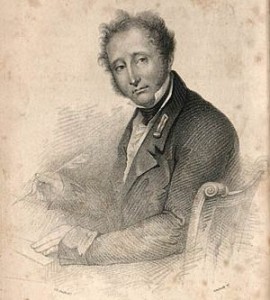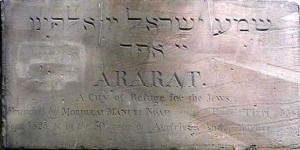Israel in Buffalo?
Mordecai Manuel Noah (1785-1851) is considered by many to be America’s first famous Jew. Coming from a blended family of Sephardic-Portuguese and German-Ashkenazi Jews, Noah’s father was one of the main financiers of the American Revolution. Mordecai began his career in trade, then moved into law while living in South Carolina. He made a name for himself as a journalist, writing passionately to drive the American cause and boosting the nation’s morale in the face of war with the British Empire. For his wisdom and eloquence, President Madison appointed him consul to Imperial Russia in 1811, then consul to Tunis in 1813. There he worked to fight against marauding pirates and saved countless Americans captured and enslaved in Morocco. However, in 1815 the anti-Semitic President Monroe repealed Noah’s position. This stirred a massive controversy. Former presidents John Adams, Thomas Jefferson and James Madison all joined Noah’s side, championing equality for all. Nonetheless, Noah left politics, returning to New York where he founded a variety of newspapers (including the Enquirer). He wrote several popular plays (including the famous She Would be a Soldier), as well as three books. He is a founder of New York University and Mt. Sinai Hospital, and also served as a judge and sheriff of New York. But most intriguing of all is that in 1825 Mordechai Noah bought a massive piece of land near Buffalo to be established as a Jewish state called “Ararat”. Surprisingly, thousands of Christians came out in support to lay the first cornerstone, along with Masons, the New York militia and St. Paul’s Church! Unfortunately, the project failed, and Noah realized a Jewish state could only be established in the Holy Land. To this he dedicated the last years of his life, spearheading the return to Israel long before Herzl and the Zionists.
Words of the Week
The progeny of Abraham are likened to the dust of the earth (Genesis 13:16), and to the stars of the heavens (Genesis 15:5). For when they fall, they fall as low as dust; when they rise, they rise as high as the stars.
– Midrash


